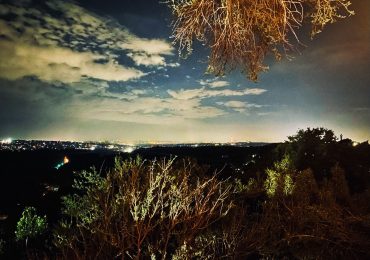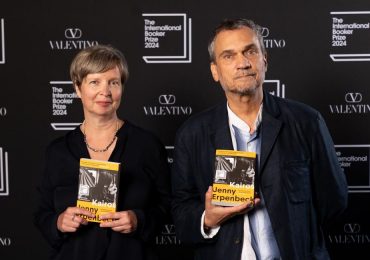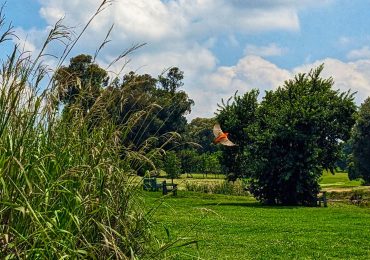The shortlist for the Golden Man Booker Prize, honouring the best work of fiction from the last five decades of the prize, has been announced at the Hay Festival.
The one-off award forms part of the Man Booker Prize’s fiftieth anniversary celebrations. All fifty-one of the previous winners were considered by a panel of five judges, with each judge reading the Booker-winning novels from one decade of the prize’s history to establish which books ‘stood the test of time’.
Golden Man Booker Prize shortlist
- In a Free State by VS Naipaul (1971) (Judge: Robert McCrum)
- Moon Tiger by Penelope Lively (1987) (Judge: Lemn Sissay)
- The English Patient by Michael Ondaatje (1992) (Judge: Kamila Shamsie)
- Wolf Hall by Hilary Mantel (2009) (Judge: Simon Mayo)
- Lincoln in the Bardo by George Saunders (2017) (Judge: Hollie McNish)
Members of the public are now invited to vote on their favourite from the shortlist. Voting with take place from 26 May to 25 June 2018 on the Man Booker Prize website, which will also feature videos of each judge discussing their choice.
The winner, as chosen by the public, will be announced and presented with a trophy at the closing event of the Man Booker 50 Festival in London on 8 July 2018. The five judges will also debate the merits of their chosen shortlisted books at the event.
Judges’ comments on the Golden Five, from the Man Booker Prize:
Robert McCrum:
I chose to nominate In A Free State for three principal reasons. First, it is outstandingly the best novel to win the Booker Prize in the nineteen-seventies, a disturbing book about displaced people at the dangerous edge of a disrupted world that could have been written yesterday, a classic for all seasons. Secondly, it signals the maturity of the novelist who would go on to write at least two contemporary masterpieces, Guerrillas and A Bend in the River. Shockingly, despite Naipaul’s genius, neither of these took the Booker Prize. And finally, I chose In a Free State because it exemplifies the work of the writer I consider to be the greatest living exponent of English prose fiction. VS Naipaul is a master, with the literary equivalent of perfect pitch. In my book, he deserves to be placed at the head of the profession.
Kamila Shamsie:
The English Patient is that rare novel which gets under your skin and insists you return to it time and again, always yielding a new surprise or delight. It moves seamlessly between the epic and the intimate—one moment you’re in looking at the vast sweep of the desert and the next moment watching a nurse place a piece of plum in a patient’s mouth. That movement is mirrored in the way your thoughts, while reading it, move between large themes—war, loyalty, love—to tiny shifts in the relationships between characters. It’s intricately (and rewardingly) structured, beautifully written, with great humanity written into every page. Ondaatje’s imagination acknowledges no borders as it moves between Cairo, Italy, India, England, Canada—and between deserts and villas and bomb craters. And through all this, he makes you fall in love with his characters, live their joys and their sorrows. Few novels really deserve the praise: transformative. This one really does.
Lemn Sissay:
I chose Moon Tiger by Penelope Lively for three reasons. First, I’ve never read a book about the Second World War written by a woman about a woman. Second, Lively’s ability to bring her character and the world she inhabits into full technicolor is beautiful. And third because of the risks she takes in how she changes the pattern of the story. The central character of Moon Tiger is dying from the start, but what a life Claudia Hamilton has had. What a woman: historian lover and war reporter. This is a unique book about a fascinating unpredictable woman way ahead of her time and yet absolutely of her time. She barely speaks. She is incapacitated in a hospital bed. Claudia Hamilton writes a history of the world and of her life all inside her head. Her family won’t hear this story though it is about them. None of her lovers either. She bears all without fear or favour. The nurse patronises her. Her family visit and talk over her. But the lucky reader is given access to the mind of an incredible woman, by invitation of a wonderful writer.
Simon Mayo:
My reading for this prize took me on quite an epic adventure with books set in Canada, India then Texas and Australia. But finally I returned to England. Specifically England. I’ve chosen the book that even though it is set hundreds of years ago, seemed to me to be the most contemporary. Hilary Mantel’s Wolf Hall is equally adept at the tiny, the micro an exquisite description of feathers in a fancy dress costume is breathtaking – and the vast, the macro—the huge swirls of international diplomacy, splitting from Rome, politics, politicians and royalty. Oh so much royalty. It seemed, in its questioning of what England is and how it can disengage from Rome, of who should rule and where should power be held, to be a book as anguished as any essay about Brexit you’ll read in the papers. And in its central character of Thomas Cromwell, Mantel provides a masterly chief of staff, a spin doctor, enforcer and sceptic to echo through the ages.
Hollie McNish:
I have never read a book like Lincoln in the Bardo. So many of the books on my list had me desperate to keep reading every time I had to stop and get on with normal life, but Lincoln in the Bardo not only had this effect on me, it made me question so much through the style in which it is written—from the structure and opportunities of writing itself, to the total subjectivity of historic facts and documentation. A few of the other novels were dedicated to discussing this matter, but Lincoln in the Bardo went further, and showed this through its brilliantly imaginative use of source material. I thought as a story, it was so funny, imaginative and tragic, but also a piece of genius in its originality of form and structure.
Image: Man Booker Prize





